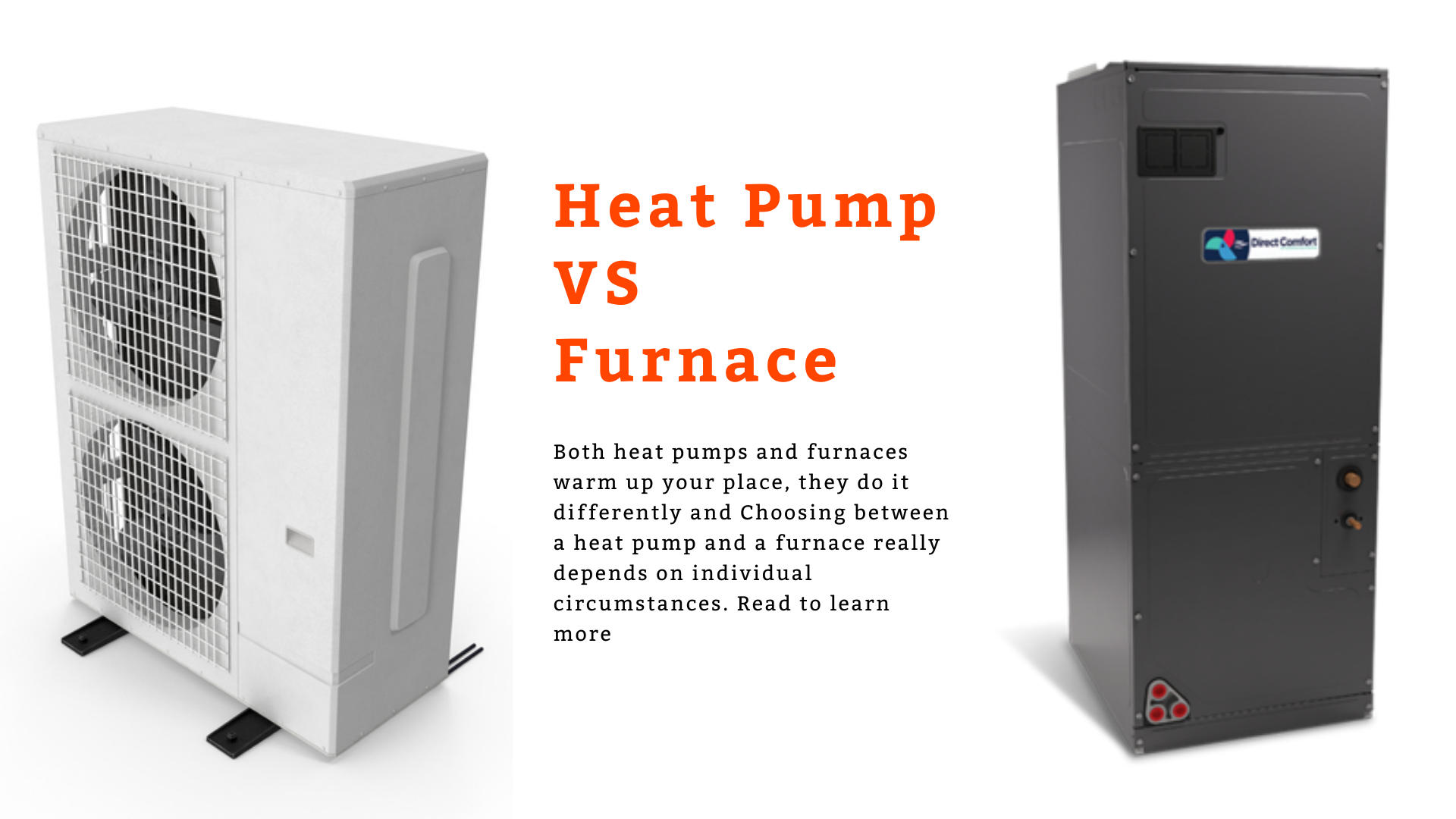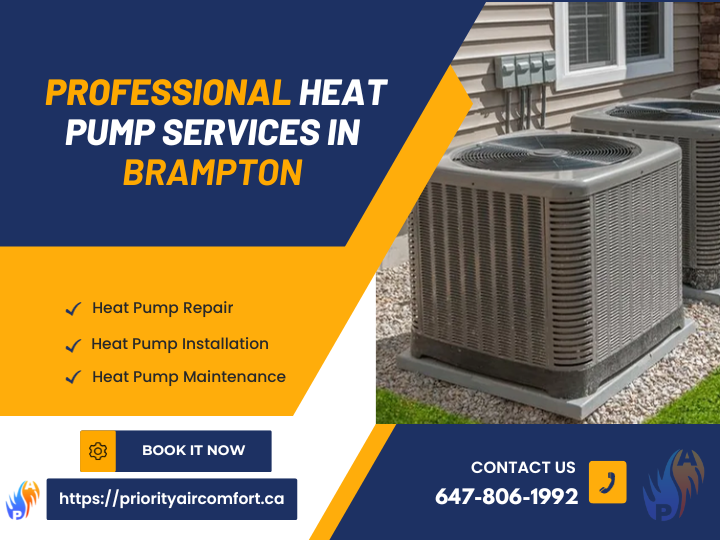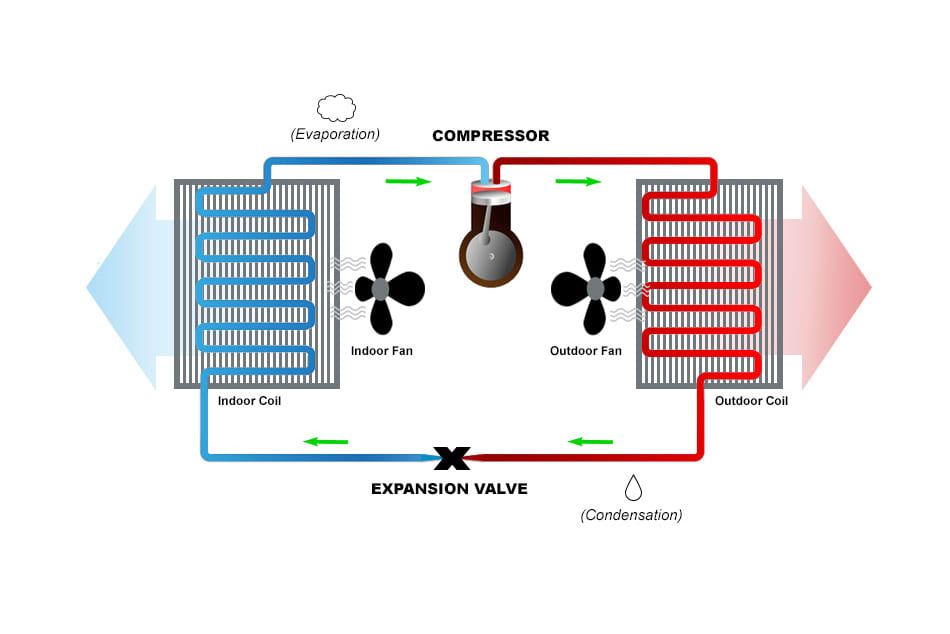If you are looking to install a new heating system or replace the existing one in Brampton, you might have come across the query heat pump vs furnace. These two heaters work in their own unique ways, and each has its pros and cons. It’s essential to pick the right one for your home.
A heat pump doesn’t create heat itself. Instead, it takes warmth from the outside air and brings it inside your house. Plus, it can also cool your home during hot days, making it useful all year long.
On the other side, a furnace makes heat by burning fuel. If you want your home cool during the summer, you’d need a separate air conditioner alongside it.
Even though both heat pumps and furnaces warm up your place, they do it differently. In places with super cold climates like in Canada, a heat pump might not keep your house warm enough. But remember a furnace won’t help cool your home when it’s really hot outside.
So, choosing between a heat pump vs furnace depends on what you need for your home and the kind of weather you face.
Table of Contents
What is a Heat Pump?

So, what exactly is a heat pump? A heat pump works by transferring heat from one place to another. Even when it’s cold weather, there’s still some warmth in the air. The heat pump pulls that warmth from the outside air and brings it inside to heat your home. During summers, it does the opposite: it takes the warm air from inside your house and pushes it outside to cool things down. It uses electricity and a special liquid to move this heat around.
So, instead of creating heat, as furnace do, a heat pump system simply moves it from where you don’t want it to where you do, making it an efficient way to keep your home comfortable.
This way, you get comfortable temperatures throughout the year without requiring separate systems for heating and cooling. If you live somewhere very cold, like in the winter in certain areas, you can add a small electric heating feature to make sure it stays warm inside.
How Does a Heat Pump Work?
During hot summers, in Canada, these heat pumps act like air conditioning units. However, when temperature decreases, heat pumps reverse their function.
Air source heat pumps operate through
- An outdoor unit
- An indoor unit
- A refrigerant line linking the two units
- A reverse valve for mode switching (from cooling to heating)
By going through a process of evaporation and condensation inside coils found in both units, a heat pump captures and effectively moves heat from one place to another.
What is a Furnace?
A furnace is a heating system typically found in homes and buildings. It operates by burning fuel, such as natural gas, oil, or propane, to produce heat. This generated heat is then distributed throughout the building using a network of ducts or pipes, ensuring that indoor spaces remain warm during colder periods.
How Does a Furnace Work?
Before installing a furnace in Brampton, it’s good to understand how it operates. By getting insights into how a furnace works, homeowners can make informed decisions about the type of furnace that best suits their needs, the basic maintenance requirements, and the potential benefits in terms of energy efficiency and cost-effectiveness.
In simple terms, A gas furnace operates using:
- A burner
- Heat exchangers
- A blower fan
- A vent hot gas exhaust
When you raise the thermostat setting, the gas furnace gets the signal and transfers fuel to its burners. A small flame, known as a pilot light, starts these burners, warming the heat exchanger. Afterwards, the fan blows air over this heated part, circulating warm air throughout your house.
Heat Pump vs. Furnace: Which Heating System Is Right For You?
Is a heat pump better than a furnace? You might have come across this question while looking for a heating system for your home or office spaces. As there are several options, it can be difficult to choose the one that is the right fit for you. Don’t worry! Here is the guide to help you understand the difference between a heat pump vs furnace which will help you make better choices.
It is also a good idea to contact an HVAC contractor in Brampton who can help you out with the best advice.
Choosing between different heating options can be tricky. However, knowing the basic differences between heat pumps and furnaces can make things clearer. This way, you can make smarter choices about keeping your home warm. Let’s dive into deeper insights into the Pros and Cons of heat pumps vs furnaces.
Pros and Cons of Heat Pump vs Furnace
Both heat pumps and furnaces might seem similar because they both heat your home, but they work in different ways. Here’s a simple comparison to help you understand the main differences between heat pumps and furnaces depending on various factors.
Heat Pump vs Furnace Cost
Heat Pumps
Installing a heat pump in your home typically costs between $3,500 and $4,500. The final price can vary based on factors like whether you already have ductwork, the system’s size, and which type of heat pump you choose.
Air-to-air heat pumps: These pull heat from the air outside your home. They’re straightforward and usually cheaper, but they might not be as efficient in very cold areas.
Geothermal heat pumps: These use pipes buried underground to get heat. They tap into the consistent 50-degree temperatures below the Earth’s surface. Setting up these systems involves drilling, making them pricier than the air-to-air ones.
Furnace
Installing a furnace can cost anywhere between $4,000 (for electric) and $4,500 (for gas). While gas furnaces are more efficient, installing a gas line to your house can be costly. Because of this, electric furnaces might be a more cost-effective choice for some people.
Durability
Heat Pump
Usually, heat pumps last about 15 years, but you’ll need to take good care of them with regular check-ups. Over time, parts like the pumps and refrigerants might need changing.
Furnace
Furnaces are simpler than heat pumps, so they often stick around a bit longer. If you keep it well-maintained, a furnace can last up to 20 years before you might think about getting a new one.
Maintenance
Heat Pump
Taking care of a heat pump requires a bit more effort than looking after a furnace, but it’s not too difficult. Here’s what homeowners can do:
- Make sure no ice or snow blocks the pump during winter.
- Clear away leaves, plants, and other stuff that might gather around the heat pump.
- Swap out the air filters about once a month.
- Clean coils whenever they get dirty.
Doing these simple tasks helps the heat pump work well for a long time and saves energy.
Furnace
Keeping a furnace in good shape is pretty straightforward. Just change its filter regularly and give it a vacuum inside now and then. Also, before the cold season starts, use sandpaper to clean the flame sensor to make sure it runs smoothly.
Heat Pump vs Furnace Efficiency
Heat Pump
Heat pumps use a little electricity to shift heat from one place to another, making them pretty energy-wise most of the time. But when it gets super cold, especially in places with harsh winters, they might struggle a bit to keep things warm, making them not as effective as furnaces.
Furnace
Furnaces make their own heat, using things like natural gas, propane, oil, or electricity. While natural gas stands out as the most efficient option, it might not be as efficient as a heat pump in regular situations. Still, when winter really hits hard, furnaces shine because they can produce their own warmth.
Appearance
Heat Pump
While heat pumps get the job done efficiently, they aren’t exactly attractive. Most times, you’ll spot a sizable unit outside your home. Plus, with mini-splits, you might end up with bulky machines hanging on your walls, which can be a bit of an eyesore.
Furnace
In contrast to heat pumps, furnaces are pretty discreet. They’re often tucked away in places like basements, attics, or utility rooms, keeping them hidden and not taking up your valuable space. For those who like a tidy look, especially with limited outdoor space, furnaces can be a more appealing choice.
Save Money With Canadian Rebates
Saving money with heat pump rebates can be a great way to offset some of the costs associated with home improvements, energy-efficient appliances, or renovations. Many provinces and territories in Canada offer various heat pump rebate programs to incentivize residents to adopt more sustainable and energy-efficient practices.
Canada home energy upgrade programs often exist to encourage homeowners to make energy-efficient upgrades such as improving insulation, installing energy-efficient windows, or upgrading to energy-efficient heating and cooling systems like heat pumps or furnaces.
To take advantage of these heat pump rebates in Ontario, it’s essential to stay updated on the available programs and ensure you meet any eligibility criteria of your territory. Additionally, some federal programs might also offer rebates or tax incentives for heat pump installations.
Saving money through government incentives can be a significant boon for Canadian homeowners, especially with programs like the Canada Greener Homes Grant. This initiative by the Government of Canada aims to make homes more energy-efficient by providing homeowners with rebates for various upgrades.
Many provinces and territories across Canada offer rebate programs, but with the Canada Greener Homes Grant, homeowners can access federal assistance. This grant encourages Canadians to adopt energy-efficient practices, such as upgrading insulation, installing energy-efficient windows, or switching to eco-friendly heating systems like heat pumps or furnaces.
Heat Pump vs. Furnace: Which Is Best for You?
Choosing between a heat pump and a furnace really depends on individual circumstances. If you live in a milder climate, a heat pump might catch your eye because of its efficiency and ease of maintenance. But If you’re in a chilly area and have access to natural gas, a furnace could be more appealing due to its straightforward operation, effectiveness in extreme cold, and neat look. Whatever the situation, it’s essential for homeowners to weigh these factors carefully when making their choice.




